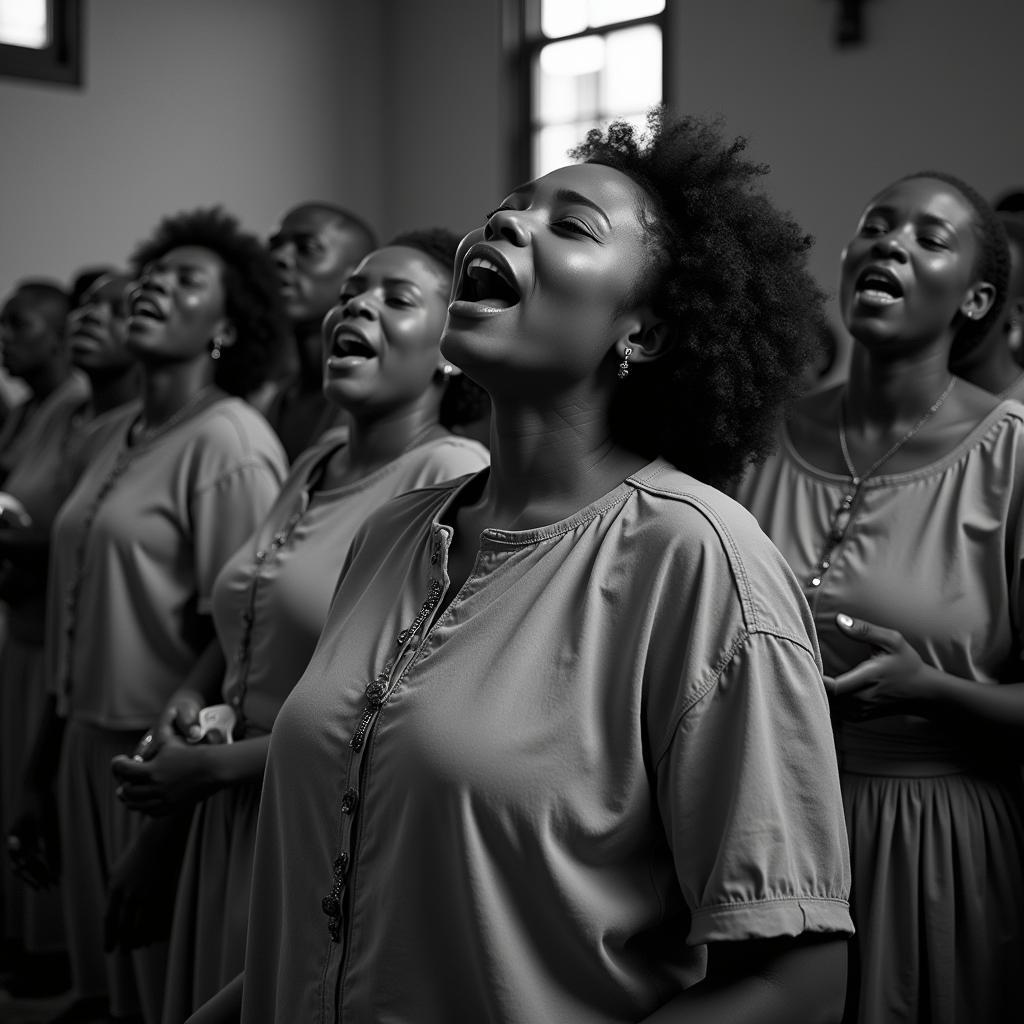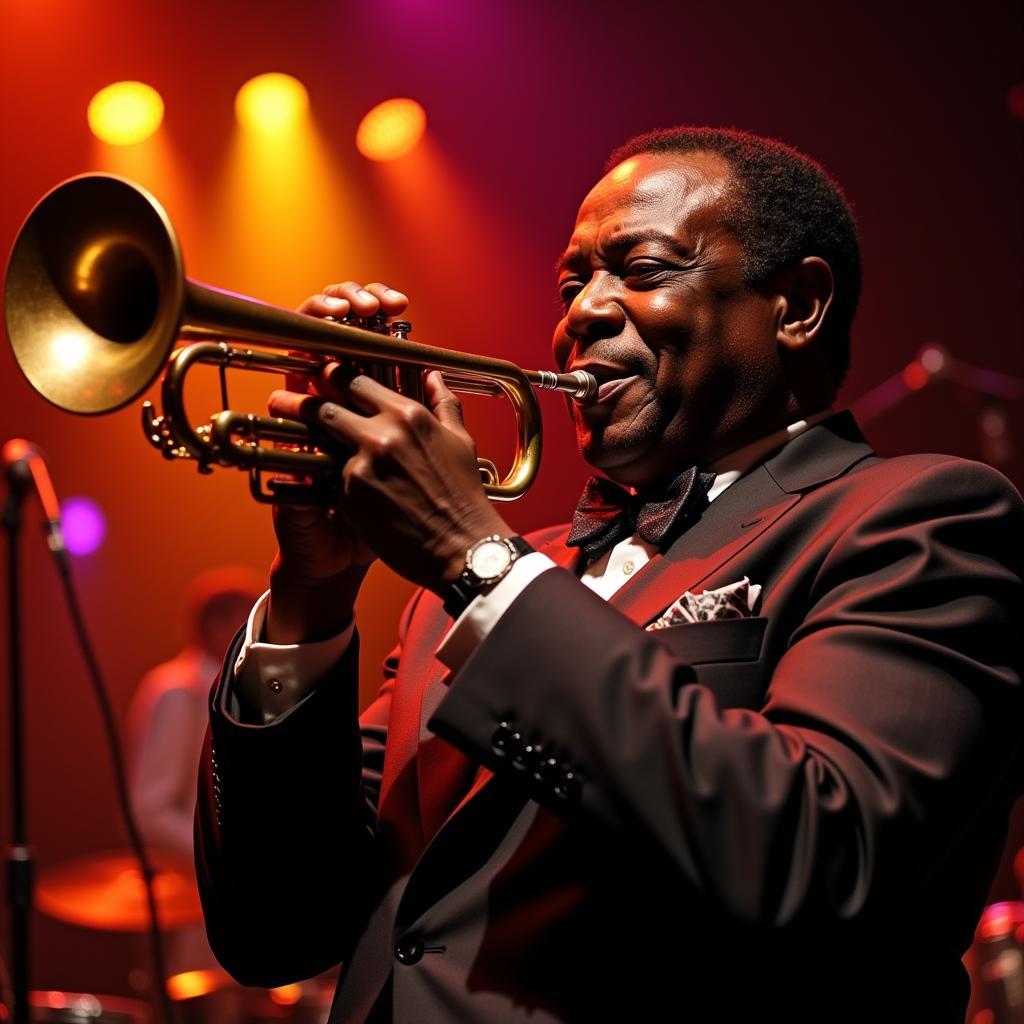African American Music Icons have shaped the soundscape of the world, leaving an indelible mark on music history. From the depths of slavery to the heights of global stardom, their artistry reflects a rich tapestry of experiences, struggles, and triumphs. This article explores the extraordinary contributions of these musical giants, whose legacies continue to inspire and resonate across generations.
From Spirituals to Blues: The Roots of African American Music
 A choir singing spirituals
A choir singing spirituals
African American music finds its roots in the harrowing experiences of slavery. Spirituals, born out of the depths of suffering and hope for deliverance, became anthems of resilience and a testament to the indomitable spirit of a people. Characterized by call-and-response patterns, soulful harmonies, and poignant lyrics, spirituals provided solace, fostered community, and served as coded messages of resistance.
As African Americans transitioned from enslavement to newfound freedoms during the Reconstruction era, the blues emerged as a powerful expression of the lived Black experience. Born in the rural South, the blues, with its melancholic melodies, raw vocals, and heartfelt lyrics about love, loss, and everyday struggles, resonated deeply with a people grappling with poverty, discrimination, and the search for identity in a rapidly changing world.
The Jazz Age and the Harlem Renaissance: A Cultural Awakening
 Louis Armstrong playing his trumpet
Louis Armstrong playing his trumpet
The turn of the 20th century witnessed the rise of jazz, a revolutionary genre that would forever alter the course of music history. Originating in the Black communities of New Orleans, jazz was a fusion of African rhythms, European harmonies, and improvisational brilliance. Pioneers like Louis Armstrong, Duke Ellington, and Billie Holiday brought their unique artistry to the forefront, captivating audiences with their virtuosity, innovation, and undeniable swing.
The Harlem Renaissance, a cultural explosion that flourished in the 1920s, provided a fertile ground for Black artists of all disciplines to express themselves freely and challenge societal norms. Jazz became the soundtrack of this era, its vibrant rhythms and improvisational spirit mirroring the era’s spirit of creativity, cultural pride, and social change.
The Soulful Revolution: R&B, Soul, and the Civil Rights Movement
 Aretha Franklin performing
Aretha Franklin performing
The mid-20th century saw the emergence of rhythm and blues (R&B) and soul music, genres deeply intertwined with the African American experience and the burgeoning Civil Rights Movement. Artists like Ray Charles, Sam Cooke, and Aretha Franklin used their voices to express not only romantic longing but also the yearnings of a people demanding equality, justice, and an end to segregation.
Soul music, with its raw emotion, powerful vocals, and messages of hope and resilience, became the soundtrack of the Civil Rights Movement. Anthems like “Respect” and “A Change is Gonna Come” galvanized a generation, providing strength and inspiration to those fighting for social justice.
Hip-Hop Emerges: From the Streets to the Mainstream
Born in the 1970s in the Bronx, New York, hip-hop emerged as a powerful voice for marginalized communities. Pioneers like DJ Kool Herc, Grandmaster Flash, and The Sugarhill Gang laid the foundation for a genre that would become a global phenomenon.
Hip-hop, with its infectious beats, rhythmic spoken word, and socially conscious lyrics, provided a platform for Black youth to express their realities, frustrations, and aspirations. From the streets to the mainstream, hip-hop has evolved into a dynamic and influential force, shaping popular culture, fashion, and social discourse.
The Legacy Continues: A Tapestry of Talent and Innovation
The influence of African American music icons extends far beyond the realm of music. Their artistry has transcended boundaries, inspiring countless artists across genres and generations. From the soulful ballads of Stevie Wonder to the groundbreaking hip-hop of Public Enemy, from the jazz fusion of Herbie Hancock to the contemporary R&B of Beyoncé, the legacy of innovation, creativity, and cultural impact continues to thrive.
Conclusion
African American music icons have left an indelible mark on the world, their artistry reflecting a rich tapestry of experiences, struggles, and triumphs. From the poignant spirituals to the revolutionary sounds of jazz, from the soulful anthems of the Civil Rights era to the global impact of hip-hop, their music continues to inspire, uplift, and provoke dialogue. Their stories are a testament to the power of music to transcend boundaries, to give voice to the voiceless, and to shape the course of history.
Leave a Reply